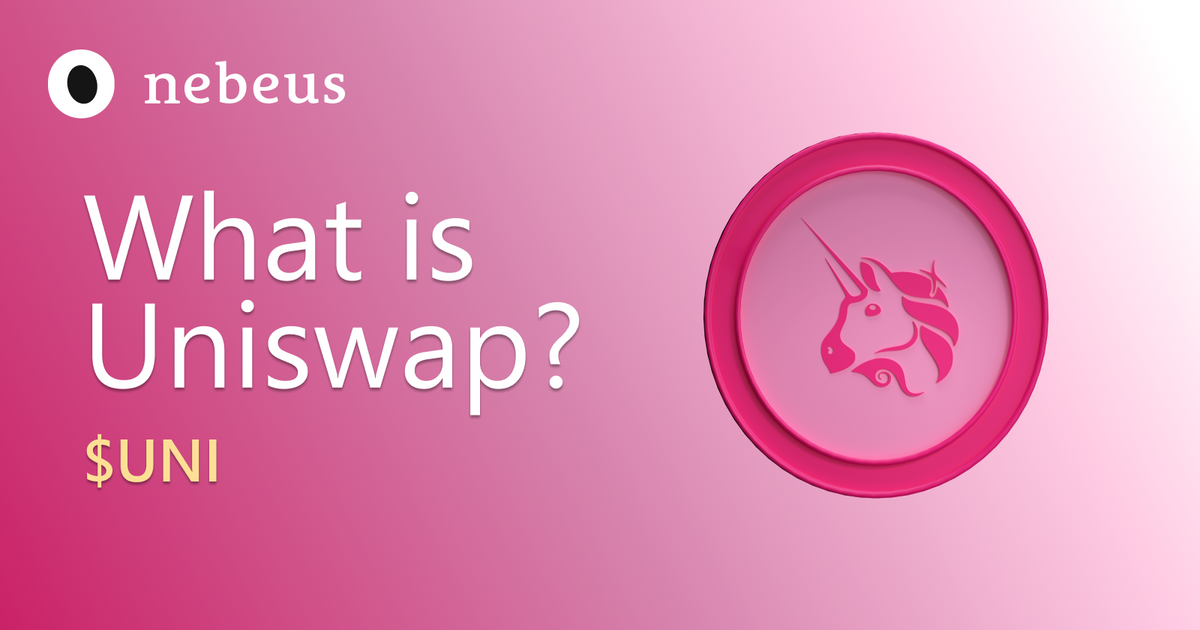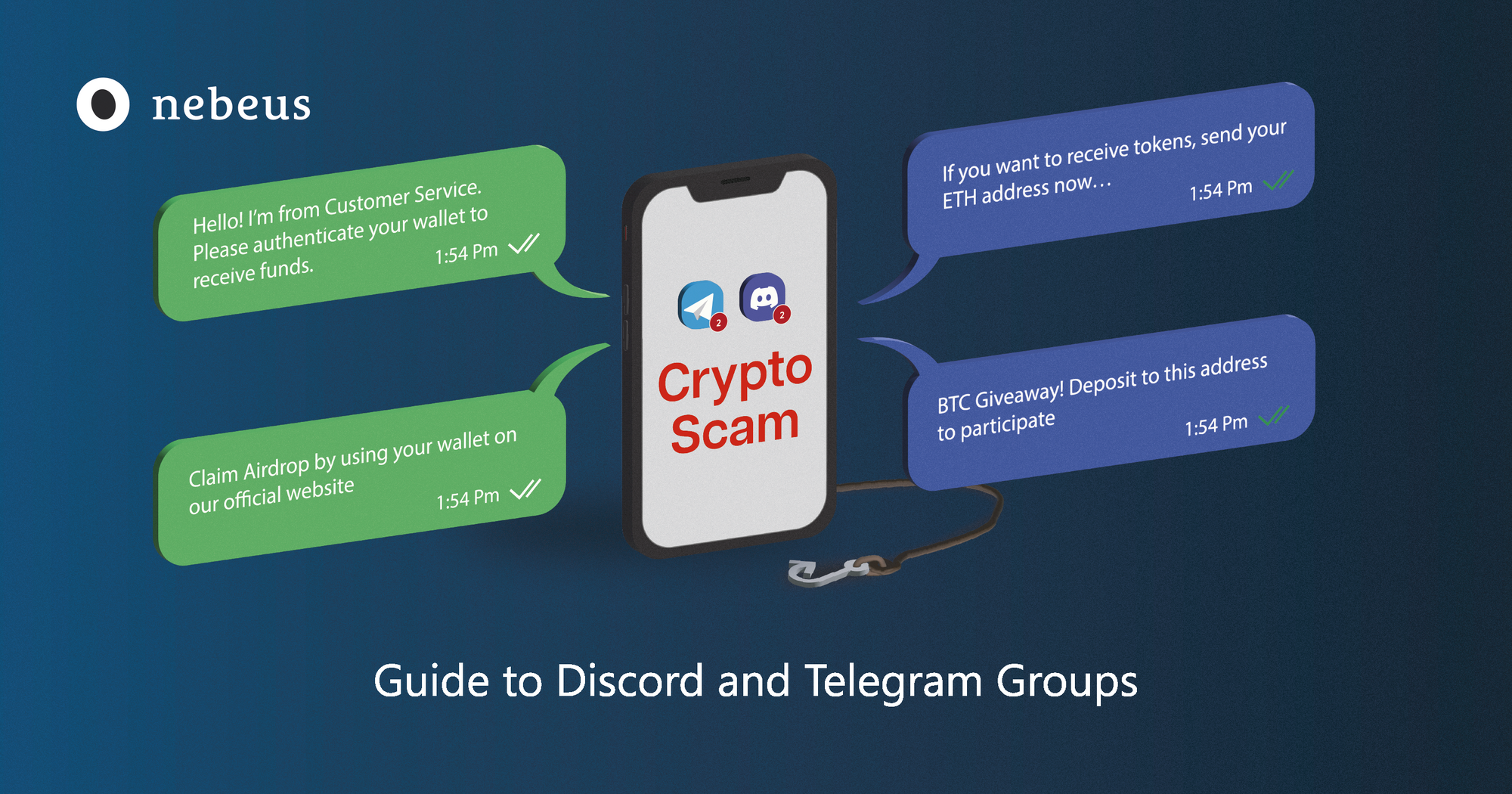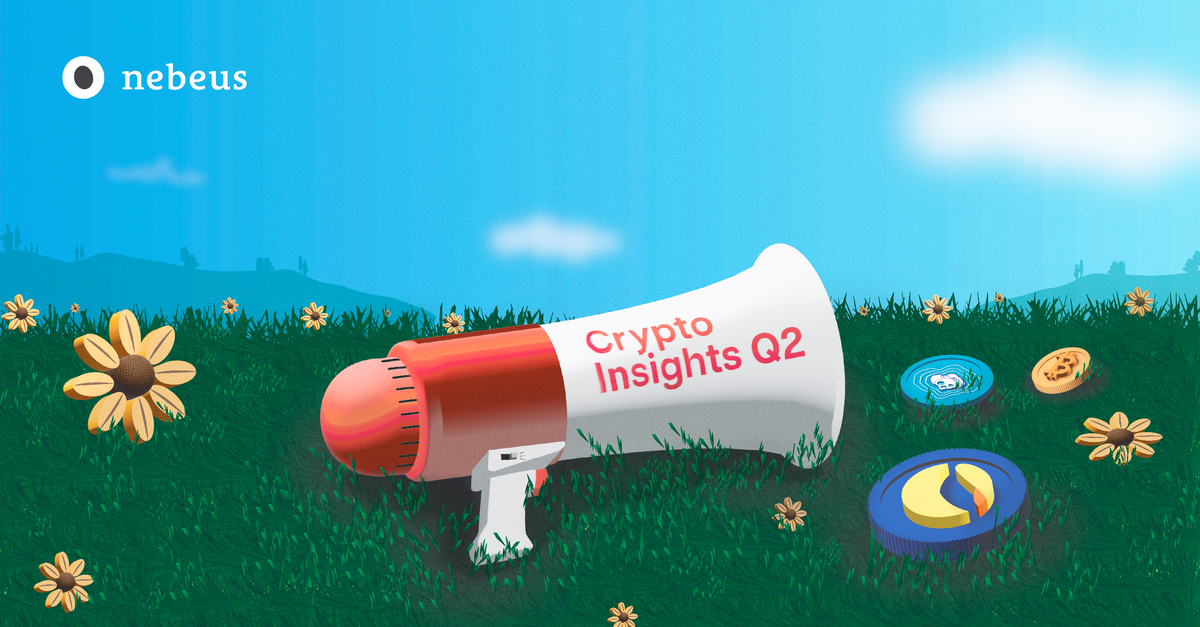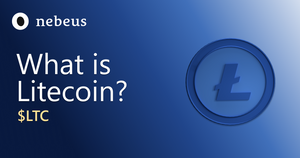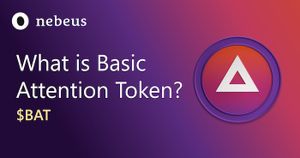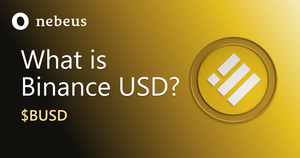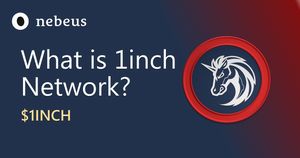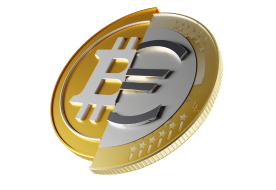“Swap, earn, and build on the leading decentralized crypto trading protocol.”
– Uniswap
Note: This is part of Nebeus’ new Coin Analysis series, where you can discover the latest crypto coin news.
What is Uniswap ($UNI)?
Uniswap is a decentralised crypto exchange (DEX) and ecosystem based on Ethereum. Put simply, it focuses on decentralised finance, often abbreviated as DeFi.
It utilises a smart contract system that employs an automated liquidity protocol powered by a constant product formula. Unlike centralised exchanges, Uniswap allows users to exchange cryptocurrencies and tokens using open-source software on blockchain networks.
As a result, one main benefit of Uniswap is that it eliminates the need for intermediaries by its core focus and belief in the power of decentralisation and the numerous advantages it brings, including censorship resistance and security.
But what does ‘eliminating intermediaries’ actually mean? Think about it this way: the majority of cryptocurrency trading occurs on centralised exchanges such as Coinbase and Binance, which are governed by a single authority. Users must place funds under a single authority’s control to be able to trade using a traditional order book system.
Put simply, to make a successful trade via this system, a buy order must be matched with a sell order for the same amount and price of an asset. For example, if you wanted to sell one Ethereum (ETH) for $1,100 on a centralised exchange, you'd have to wait for a buyer on the other side of the order book who wants to buy an equal or higher amount of Ethereum at that price.
There’s a fundamental issue with this system. That issue involves liquidity, where if liquidity is low, then hopeful traders will be unable to complete their buy and sell orders. Liquidity, in this instance, is best explained if we use the example of seller at a market:
- Liquid Market – a crowded market is a space filled to the brim with both sellers and buyers
- Narrow Market – the market is like a ghost town. No one is buying anything, and no one is selling anything
Things can start to fall apart if the Narrow Market situation occurs. Traders may be unable to fulfil their buy or sell orders if liquidity is low.
Thankfully, Uniswap avoids the potential pitfall of the traditional order book system via its decentralised nature.
How Does Uniswap Work?
Uniswap is made up of two smart contracts, which are computer programmes that run automatically when certain conditions are met:
- Exchange – handles all token swaps or "trades."
- Factory – the factory smart contract is used in this case to add new tokens to the platform.
On the updated Uniswap V2 platform, any ERC20-based token can be swapped for another.
What are Automated Liquidity Pools?
We briefly mentioned these pools above, but it’s important to focus on them as they are vital to how Uniswap tackles the liquidity problem of centralised exchanges.
To start, Uniswap encourages traders to become liquidity providers (LPs) on their exchange, which essentially creates a giant pool of everyone’s funds to form a ‘communal’ fund that is used to execute all trades on the platform.
As Uniswap is an exchange, multiple tradable tokens are listed, each with its own dedicated pool. The token prices are determined by a computer-based mathematical algorithm and Uniswap’s automated market maker system instead of an order book system.
This constant mathematical equation is used to adjust the price of an asset based on supply and demand. It works by changing the price of a token based on the number of tokens in the respective pool.
Compared to centralised exchanges, the advantage of this system is that buyers and sellers do not have to wait for the opposite party to appear for their requested transaction to be completed. Instead, a trade goes through instantly – at a known price, thanks to the algorithm. This occurs as long as the pool has enough liquidity to support it.
What is Arbitrage in Uniswap?
The Uniswap ecosystem would not be complete without arbitrage traders. These traders specialise in spotting price differences across multiple exchanges and generating small – but sometimes significant – profits. If Ethereum was trading at $1,100 on Binance and $1,075 on Kraken, you could quickly scoop up some ETH on Kraken and just as quickly sell it on Binance to make an instant profit. Whilst that leads to only $25 profit – not even accounting for fees – if this process is done in large quantities, arbitrage traders can generate significant earnings in a very (very) short period of time.
Across the board, Uniswap token prices are kept in line with the rest of the market thanks to a harmonious relationship between the automated market system and arbitrage traders. But how?
Well, on Uniswap, arbitrage traders look for tokens that are trading above or below their average market price. The reasons behind this variation are numerous, such as many large trades simultaneously causing price imbalances. These traders can buy or sell them accordingly until the token's price rebalances on Uniswap to match the price on other exchanges. It’s at this point that there is no more profit to be made.

Who is the Founder of $UNI?
“Developers, traders, and liquidity providers participate together in a financial marketplace that is open and accessible to all.”
-Uniswap
Uniswap and its first protocol version (V1), founded by Hayden Adams, a former Siemens mechanical engineer, only emerged very recently, back in November 2018. It’s made big waves in a very short period of time as in less than two years, the exchange’s daily trading volume reached $220 million on average.
The exchange continued to innovate quickly and effectively, introducing new options and features, with versions 2 and 3 released in May 2020 and May 2021, respectively.
Uniswap is backed by significant investments from numerous venture capital firms such as Andreessen Horowitz and Union Square Ventures LLC, amongst others. Due to its focus on and passion for DeFi, Uniswap has been adopted by countless traders and investors.
What is the $UNI Token?
The native token of Uniswap, UNI, is its governance token, which means holders can vote on new platform developments and changes, such as:
- How newly minted tokens should be distributed to the community and developers
- Potential fee structure changes
The history behind the UNI token is fascinating. It was created in September 2020 and helped maintain Uniswap’s position against a fork of the system, another DEX known as SushiSwap, which had quickly become a competitor.
SushiSwap had tried to draw Uniswap users away from Uniswap’s exchange by rewarding those who switched with SUSHI tokens, a new type of token that granted expanded benefits for holders. For example, it gave users governance rights over the new protocol and a proportionate share of all platform transaction fees.
To combat this, Uniswap issued 1 billion UNI tokens. 150 million were distributed to anyone who had ever used the Uniswap platform, leading to each person receiving 400 UNI tokens. At the time, these free tokens were worth more than $1,000.
Are you interested in learning more about the UNI token? Uniswap has a detailed introduction to UNI that is worth reading to get a more detailed overview of the token.
How to buy $UNI?
UNI can be found on several centralised and decentralised cryptocurrency exchanges. UNI/USD and UNI/USDT are two of the most common of many trading pairs. You can buy, send, hold and stake UNI at Nebeus.
Always keep in mind that you should do your own research before investing and never invest more money than you can afford to lose.
Is $UNI a good investment?
Uniswap skyrocketed in popularity in an extremely short period of time. If you need proof: over $70 billion is traded on Uniswap each month.
Back in October 2020, it was estimated that Uniswap was the largest decentralised cryptocurrency exchange. In addition, it was estimated to be the fourth-largest cryptocurrency exchange overall by daily trading volume.
Despite not maintaining its price after its initial meteoric rise, the UNI token has proven to be a valuable asset for early adopters. However, it’s important to remember that the token's success relies heavily on the success of Uniswap’s protocol. If you have faith in the protocol, then investing is a good idea.
At the end of the day, choosing crypto tokens to invest in often relies on personal preference – but do your homework first to ensure you’ve got all the information.
Is $UNI safe?
Because it works as a DEX and liquidity pool, the Uniswap Exchange is extremely secure. In addition, as it's based on Ethereum, it's just as secure as the Ethereum blockchain.
How do you make money on Uniswap?
Making money on Uniswap occurs in two ways:
- By earning fees as you share the fees earned by the pool from each trade performed
- And by adding liquidity because the ratio between the amount of liquidity you added and the amount added by the other pool participants determines your earnings.
What makes $UNI different? The Benefits of Uniswap
As you may have guessed, there are a ton of benefits and advantages that contribute to Uniswap’s success. That’s why Uniswap has many selling points, including:
It Utilizes an Automated Market Maker (AMM) Protocol
Uniswap uses an automated market maker (AMM) protocol. This means that instead of trading with other traders, you trade via a liquidity pool, whereby, in a trade, the pool serves as your counterparty.
In other words, your order is executed against the entire pool and its reserves rather than against another trader's order. Because investors add liquidity to pools, the benefits of the service are at least twofold, depending on whether you are a simple trader or a liquidity provider.
Your Identity Stays Hidden
One of the main draws of the Uniswap protocol is that it does not require you to sign up or reveal your identity. As it is decentralised, there is no overarching central authority. This means users can’t be blocked, and their funds cannot be seized. Plus, it prevents hackers from jumping in and potentially stealing your money on the exchange.
Furthermore, with no registration, you can get trading and jump into the Uniswap ecosystem much faster. As long as you have a supported Ethereum wallet, such as Metamask, and a wallet address to join Uniswap as a trader or liquidity provider, then you’re good to go. It's beyond simple to connect a wallet, too:
- On Uniswap, click "Launch App,"
- Click "Connect to a wallet,"
- Choose a supported wallet like Metamask
- and you're done!
To find out more, Nebeus has more information on identity verification and related KYC processes.
Uniswap is Massively Beneficial to Startup Blockchain Companies
Uniswap is also highly beneficial to blockchain startup projects that want to sell their tokens directly to the public and gain a larger audience.
It can be a painful experience to list a new coin or token on a centralised exchange, especially a prominent one – especially as it's far from certain that they'll even succeed.
With Uniswap, there are no listing fees or arduous vetting processes before a coin or token can be listed for trading. In some ways, it can function like a crowdfunding platform, with the added benefit of making all the funds available to the project.
It’s even beneficial for early investors, as the massive price swings that typically accompany a token's launch allow profit to be made from new projects that have real value.
Trader’s Love it as it can be a Gold Mine
We’ve mentioned this above, but it’s important to state it again: Uniswap is a blessing in disguise for arbitrage traders as it allows them to profit by taking advantage of price differences between Uniswap's price quotes and those of the rest of the market.
In the first version of Uniswap, arbitrage traders were heavily used for price discovery.
Subsequent versions attempt to keep Uniswap’s price quotes in sync with the larger market, so the DEX now employs a blockchain oracle. To put it another way, if these traders want to take advantage of an arbitrage opportunity, they’ll need to use more sophisticated trading strategies. Nevertheless, serious profit is still there to be made.
How many Uniswap ($UNI) coins are there?
Max Supply: 1,000,000,000
Circulating Supply (30/06/2022): 456,489,583
Currently, approximately 45.6% of the total supply is already in circulation.
Note: We gather our information from CoinGecko. The numbers written are correct at the time of writing.
What is the Current Price and current Market Cap of Uniswap? (30/06/2022)?
Current Price: $4.92
Current Market Cap: $2,243,929,221
Current Market Cap Position: #27
All-Time Low: $1.03 on September 17th, 2020
All-Time High: $44.92 on May 3rd, 2021
Note: We gather our information from CoinGecko. The numbers written are correct at the time of writing.
Conclusion
Ready to get involved with Uniswap already? Join its thriving community of users and traders on one of its channels:
- Uniswap - Reddit
- Uniswap - Twitter
- Uniswap - GitHub
- Uniswap Official - Discord
- Uniswap Website
You can sign up for a Nebeus account to buy and hold your Uniswap investment.
La inversión en criptoactivos no está regulada, puede no ser adecuada para inversores minoristas y se puede perder la totalidad del monto invertido.


